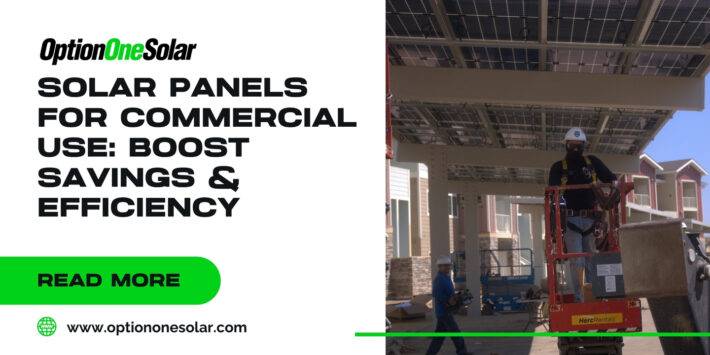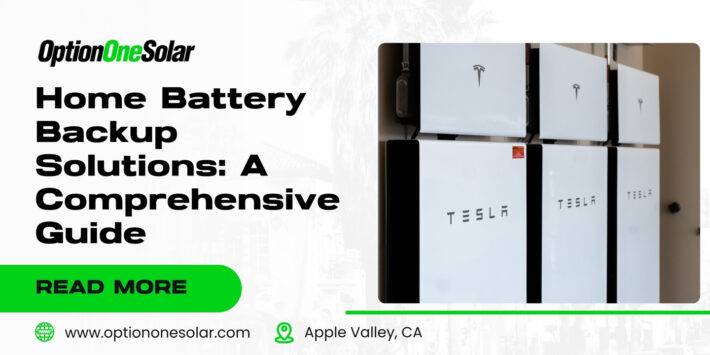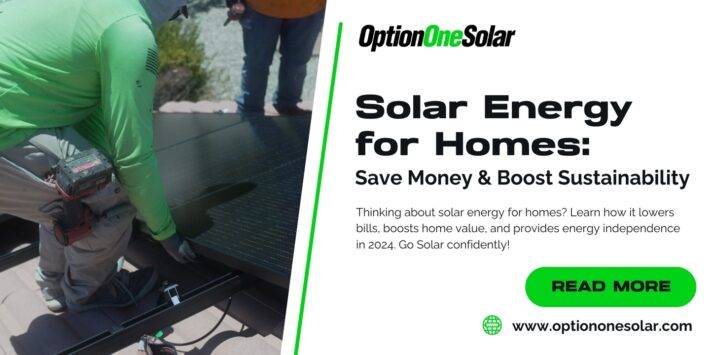The economic and environmental benefits of EVs are maximized when they are charged using renewable energy sources like solar power.
Option One delves into why solar panels are superior for charging EVs, using a Tesla Model Y as a case study. We'll also explore the advantages of adding a solar battery storage system and address whether current solar owners should expand their setup to accommodate an EV.

Why Use Solar Panels to Charge an Electric Vehicle (EV)?
Charging an EV with solar panels offers numerous benefits, making it a compelling choice over conventional charging methods. Here are the key reasons:
- Environmental Benefit: Solar power is a clean, green energy source. Charging your EV with solar energy directly reduces greenhouse gas emissions, contributing to a healthier environment.
- Energy Independence: Solar panels decrease your reliance on the grid and fossil fuels, promoting energy self-sufficiency.
- Cost Savings: Solar energy can be more cost-effective in the long run. After the initial investment, the cost of generating solar electricity is significantly lower than buying from the grid, especially with rising energy prices. And without future gas payments, homeowners are saving more money for themselves.
- Consistent Energy Rates: Solar power protects you from fluctuating energy prices, offering more predictable energy costs.

Should I Invest In Additional Solar Panels to Accommodate An EV If I Have Solar Already?
For households already equipped with solar panels, the decision to expand your solar system to charge an EV comes down to several factors:
- Current Solar Capacity: If your existing system doesn’t produce enough energy to cover additional EV charging needs, expanding your system can ensure your EV runs on solar energy.
- Cost-Benefit Analysis: Consider the long-term savings on fuel and electricity against the upfront cost of adding more panels. In many cases, the long-term savings justify the initial investment; moreover, considering the expense of gas prices that fluctuate constantly, you get fixed and predictable costs with solar energy.
- Energy Usage Patterns: If your household energy consumption has increased or is expected to increase with an EV, additional panels can help meet this demand sustainably.
- Incentives and Rebates: Look into local incentives or rebates for expanding your solar energy system, as these can significantly offset the costs. And don't forget EVs have government incentive that helps future owners.
As gas and electricity costs keep rising and the climate crisis worsens, more and more people are turning to solar power and electric vehicles (EVs).
We're seeing a record number of solar panels being installed on rooftops. Also, it's expected that by 2030, electric cars will make up 40% of all new car sales in the US, according to the US Bureau of Labor and Statistics.
The Synergy between Solar Energy, EVs, and Battery Storage
Combining solar energy with EVs represents a significant step toward a sustainable future.
Charging your EV with solar power reduces reliance on fossil fuels and minimizes greenhouse gas emissions. A battery storage system further enhances this synergy by storing excess solar energy for later use.
How Many Solar Panels Do I Need For My Electric Vehicle?
You can check out current electric vehicles' fuel economy information from the U.S. Department of Energy.
Let’s revisit the calculation for determining the number of solar panels required, applying it to a Tesla Model Y:
- Daily EV Energy Consumption: 28 kWh/100 mi×30 mi=8.4 kWh/day
- Solar System Size: Assuming 5 peak sun hours in California, the ideal solar system size is 8.4 kWh/5 hours=1.68 kW
- Solar Panel Conversion (Updated): Using 400W (0.4 kW) panels, the number of panels needed is 1.68 kW0.4 kW/panel=4.2. This rounds up to 5 panels for practical purposes.
The Role of a Solar Battery Storage System
Adding a solar battery storage system to your home can significantly enhance the efficiency and reliability of your solar power setup. Here's how:
- Energy Independence: Store excess solar energy generated during the day for use at night or during low sunlight.
- Reduced Grid Reliance: With stored energy, your dependence on the grid, especially during peak hours, decreases, which can lead to cost savings.
- EV Charging Flexibility: Charge your EV during non-peak hours using stored solar energy with smart settings, optimizing energy usage and costs.
Advantages of Battery Storage
- Energy Security: A battery storage system provides a backup power source in case of grid outages.
- Maximized Solar Utilization: Increases the proportion of solar-generated electricity used directly by your household, reducing the wastage of excess energy.
- Cost-Effective Charging: Using stored solar energy can avoid higher electricity rates during peak hours, leading to long-term savings.
Sum Up
Like a Tesla Model Y, incorporating solar panels to charge your EV is a forward-thinking approach to sustainable living.
With the correct number of panels and the addition of a battery storage system, you can maximize the benefits of solar energy, ensuring a reliable, cost-effective, and eco-friendly energy solution for your home and EV.
This holistic approach to energy management symbolizes a commitment to a cleaner, greener future, significantly impacting our environmental footprint.
As a trusted solar contractor, Option One Solar is dedicated to providing insightful and beneficial information about energy storage solutions.
The home battery backup system is an excellent choice for improving home energy efficiency and gaining energy independence.
Frequently Asked Questions
1. Why should I charge my Electric Vehicle (EV) with solar panels?
Solar panels provide a clean, green energy source. Using them to charge your EV helps reduce greenhouse gas emissions, promotes energy independence by decreasing reliance on the grid and fossil fuels, and offers significant long-term cost savings.
2. What are the benefits of adding a solar battery storage system to my home?
A solar battery storage system enhances your solar power setup by storing excess energy generated during the day for later use. It provides energy independence, reduces grid reliance, allows flexible EV charging, and offers backup power in case of grid outages.
3. How many solar panels do I need to charge my Tesla Model Y?
For a Tesla Model Y with a daily energy consumption of 8.4 kWh (based on 30 miles driving), and assuming 5 peak sun hours in California, you would need around 5 panels of 400W each. This calculation can vary based on local sun hours and driving habits.
4. Is it worth investing in additional solar panels for my EV if I already have a solar system?
Yes, if your current solar setup does not produce enough energy for EV charging, adding more panels can be beneficial. Consider long-term savings on fuel and electricity, your household's energy usage patterns, and local incentives or rebates when making this decision.
5. How does charging an EV with solar panels impact my energy costs?
Charging your EV with solar panels can be more cost-effective in the long run. It eliminates future gas expenses and provides consistent energy rates, protecting you from fluctuating energy prices.
6. Can solar panels fully cover the energy needs of an EV?
This depends on the capacity of your solar panel system, your driving habits, and the efficiency of your EV. A well-designed solar system can meet or even exceed the energy needs of your EV.
8. What happens to the excess energy generated by my solar panels?
Excess energy can be stored in a solar battery storage system for later use or, in some cases, fed back into the grid, potentially earning you credits from your utility company.





